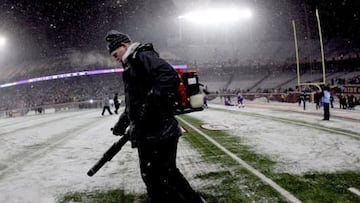Sunday’s clash between the Rams and the Bengals could be the warmest Super Bowl ever – but which NFL title decider was played in the coldest conditions?
William AllenWAS_AllenUpdate: Feb 12th, 2022 08:07 EST

Getty ImagesCowboys kicker Brandon Aubrey welcomes new son to the worldDallas Cowboys positional battles one week before cut dayESPN provide latest update on Cowboys wide receiver CeeDee Lamb: “Very little movement”How many teams have yet to p out their QB rotation?What is Tyreek Hill’s 40 time? And his 100m time?Looking at the dynamic kickoff: Will the NFL move the touchback spot to the 35?
Super Bowl LVI is set to be one of the hottest – if not the hottest – ever played.
Temperatures are expected to be in the 80s in Inglewood, California, when the Los Angeles Rams face the Cincinnati Bengals at SoFi Stadium this weekend.
Miami-Washington Super Bowl sizzler the hottest so far
As things stand, the highest game-time temperature recorded at an NFL title decider was in Super Bowl VII – a clash also played in the Los Angeles area.
That day in January 1973, the Miami Dolphins defeated Washington 14-7 at a Los Angeles Memorial Stadium where the kickoff temperature was 84ºF, according to ps compiled by the Pro Football Hall of Fame.
Current forecasts for SoFi Stadium on Sunday anticipate a maximum temperature of 82ºF, which would make Super Bowl LVI the second-warmest in history – just ahead of the 81ºF at San Diego’s Qualcomm Stadium in January 2003, when the Tampa Bay Buccaneers beat the Oakland Raiders 48-21 at Super Bowl XXXVII.
See also:
Super Bowl LVI: live build-up
Super Bowl VI the coldest on record
As for the coldest Super Bowl ever witnessed, that came the year before the hottest.
At Super Bowl VI in January 1972, the kickoff temperature at New Orleans’ Tulane Stadium was barely above freezing – 39ºF – for a game that saw the Dolphins lose 24-3 to the Dallas Cowboys.
Three years later, Tulane Stadium then staged the second-coldest Super Bowl ever, with thermometers reading 46ºF in the Pittsburgh Steelers’ 16-6 Super Bowl IX victory over the Minnesota Vikings.
Three coldest outdoor Super Bowls in history
| Super Bowl and date | Result | Venue | Kickoff temperature | |
| 1. | VI, 16 January 1972 | Dallas 24-3 Miami | Tulane Stadium, New Orleans, LA | 39ºF |
| 2. | IX,12 January 1975 | Pittsburgh 16-6 Minnesota | Tulane Stadium, New Orleans, LA | 46ºF |
| 3. | XLVIII, 2 February 2014 | Seattle 43-8 Denver | MetLife Stadium, East Rutherford, NJ | 49ºF |
Way below freezing for Super Bowl LII – but game held indoors
Temperatures were actually far lower in Minneapolis, Minnesota, when the city hosted Super Bowl LII in February 2018, but the Philadelphia Eagles’ 41-33 win over the New England Patriots was played in the enclosed U.S. Bank Stadium
While it was 30 degrees below freezing outside, the game-time temperature inside the Super Bowl arena was a pleasant 70ºF.
Other Super Bowls have also been played indoors amid sub-freezing outdoor conditions, such as Super Bowl XL, held in February 2006 at Ford Field in Detroit, where the outside temperature was 30ºF.
It's below freezing in Minneapolis, Minnesota, and Super Bowl LII is expected to be the coldest on record. As one Minnesotan puts it: "It could be in Miami, but it's hot and sticky there…and we've got a lot to offer, it's fun up north." https://t.co/57eWUbTEKH pic.twitter.com/pESAKdVXsB
— CBS News (@CBSNews) February 4, 2018
The ‘Ice Bowl’ – NFL’s coldest ever game
Super Bowl VI’s record-low temperature appears positively clement when compared to the weather for the coldest game played outdoors in NFL history.
Since dubbed the ‘Ice Bowl’, December 1967’s NFL Championship Game between the Green Bay Packers and the Cowboys took place amid winter Wisconsin temperatures that dropped to -13ºF at Lambeau Field.
It was so cold, indeed, that referee Norm Schachter’s metal whistle froze to his lip as he blew it to signal the start of the game. In the process of separating his whistle from his mouth, Schachter then ripped off a piece of his lip.

